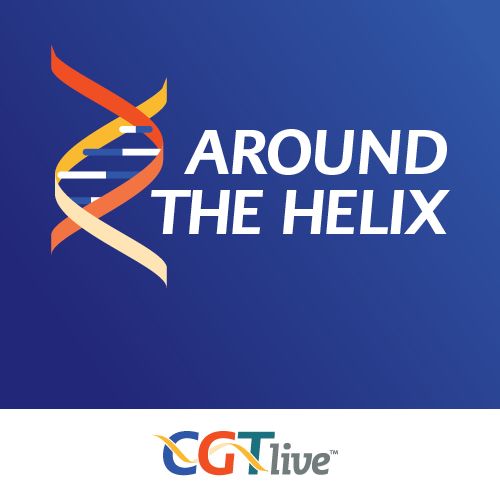Around the Helix: Cell and Gene Therapy Company Updates – November 13, 2024
Catch up on the latest news, breakthroughs, and announcements from biotechnology companies making advancements in cell and gene therapies.

The cell and gene therapy sectors are growing exponentially, with new players emerging daily and much progress being made both in and out of the lab. CGTLive®’s Around the Helix is your chance to catch up with the latest news in cell and gene therapies, including partnerships, pipeline updates, and more.
Have a cell and gene therapy news update you’d like to share with our editorial team? Tag us on social and use #AroundTheHelix!
1. FDA Approves Obe-Cel for Adults With R/R B-Cell Precursor Acute Lymphoblastic Leukemia
The FDA announced that it approved obecabtagene autoleucel (Aucatzyl; Autolus Inc), known colloquially as obe-cel, a CD19-directed genetically modified autologous T-cell immunotherapy, for the treatment of adults with relapsed or refractory (r/r) B-cell precursor acute lymphoblastic leukemia. The therapy was approved based on the findings of the pivotal phase 1b/2 FELIX clinical trial (NCT04404660), which showed rates of overall complete remission (CR) above 60% and a median duration of remission beyond 12 months for those who achieved complete remission within 3 months.
2. FDA Removes Clinical Holds Previously Placed on 3 of CARsgen's Oncology Cell Therapies
The FDA has removed clinical holds from the phase 1b/2 LUMMICAR 2 clinical trial (NCT03915184) evaluating CARsgen's BCMA-directed chimeric antigen receptor T-cell (CAR-T) therapy zevorcabtagene autoleucel(zevor-cel) for relapsed/refractory (r/r) multiple myeloma (MM), the phase 1b/2 ELIMYN18.2 (ST-02) clinical trial (NCT04404595) evaluating its Claudin18.2-directed CAR-T satricabtagene autoleucel(satri-cel) for gastric/pancreatic cancers, and a phase 1/2 clinical trial (NCT06333509) evaluating its GPRC5D-directed CAR-T CT071 for r/r MM and r/r primary plasma cell leukemia.
3. Patient With Sickle Cell Disease Dies From Complications Related to Busulfan-Conditioning Following Treatment With Beam’s Base-Editing HSC Therapy BEAM-101
A patient treated for sickle cell disease (SCD) in the context of Beam Therapeutics’ phase 1/2 BEACON clinical trial (NCT05456880), which is evaluating the company’s investigational base-edited autologous hematopoietic stem cell (HSC) therapy BEAM-101, has died. The patient’s death was deemed by the trial’s investigatory to be related to the busulfan-conditioning regimen that patients must receive prior to administration of BEAM-101, rather than to the HSC therapy itself.
4. Neurogene’s Rett Syndrome Gene Therapy NGN-401 Demonstrates Efficacy in Low-Dose Cohort, But Serious Adverse Event in High-Dose Group Raises Concerns
Neurogene’s NGN-401, an investigational adeno-associated virus (AAV) vector-based gene therapy intended to treat Rett syndrome, has generated positive efficacy results in the low-dose cohort of aphase 1/2 pediatric clinical trial (NCT05898620), but an emerging treatment-related serious adverse event (SAE) was reported in a patient treated in the study’s high-dose cohort.
5. FDA Accepts Abeona Therapeutics' BLA for Epidermolysis Bullosa Gene Therapy Pz-Cel
Abeona Therapeutics' biologics license application (BLA) for prademagene zamikeracel (pz-cel; EB-101), an investigational autologous gene-corrected epidermal sheet therapy for the treatment of patients with recessive dystrophic epidermolysis bullosa, has been accepted for filing by the FDA. The agency has set the Prescription Drug User Fee Act (PDUFA) action date for the BLA for April 29, 2025.
6. Preclinical Research Supports Potential of Inhaled mRNA Therapeutics
A study published in the Journal of the American Chemical Society tested a zwitterionic polymer (ZIP)–lipid conjugate as an alternative delivery vehicle for mRNA that is optimized for inhalation-based administration, in comparison to the PEG-lipid lipid nanoparticle (LNP) approach that is traditionally used for mRNA delivery. The ZIP-LNP approach showed improved inhaled mRNA delivery in the lungs of mice and was well-tolerated.
7. Atamyo Therapeutics' ATA-200 Cleared for US Trial in LGMD Type 2C/R5
The FDA has cleared an investigational new drug application for Atamyo Therapeutics' ATA-200, , an investigational AAV vector-based gene therapy intended to treat γ-sarcoglycan-related LGMD Type 2C/R5 (LGMD2C/R5), enabling the company to go forward with plans for a phase 1b dose escalation clinical trial (NCT05973630). Notably, the trial is supported by funding from The Dion Foundation for Children with Rare Diseases.
8. Nippon Shinyaku Obtains Commercialization Rights for Atsena's LCA1 Gene Therapy
Under a new agreement, Nippon Shinyaku has acquired commercialization rights for Atsena Therapeutics’ ATSN-101, an investigational AAV vector-based gene therapy intended to treat Leber Congenital Amaurosis caused by biallelic mutations in GUCY2D (LCA1), in the United States, as well as development and commercialization rights for the therapy in Japan. Atsena will continue to have commercialization rights for the product in the rest of the world. “This collaboration creates a path to accelerate the development of ATSN-101 and validates Atsena’s pioneering technology and development capabilities..." Patrick Ritschel, MBA, the CEO of Atsena, said in a statement. “We look forward to working with Nippon Shinyaku as we advance ATSN-101 into a pivotal trial and potential approval to provide an innovative solution to patients and families affected by LCA1 around the world.”
Newsletter
Stay at the forefront of cutting-edge science with CGT—your direct line to expert insights, breakthrough data, and real-time coverage of the latest advancements in cell and gene therapy.